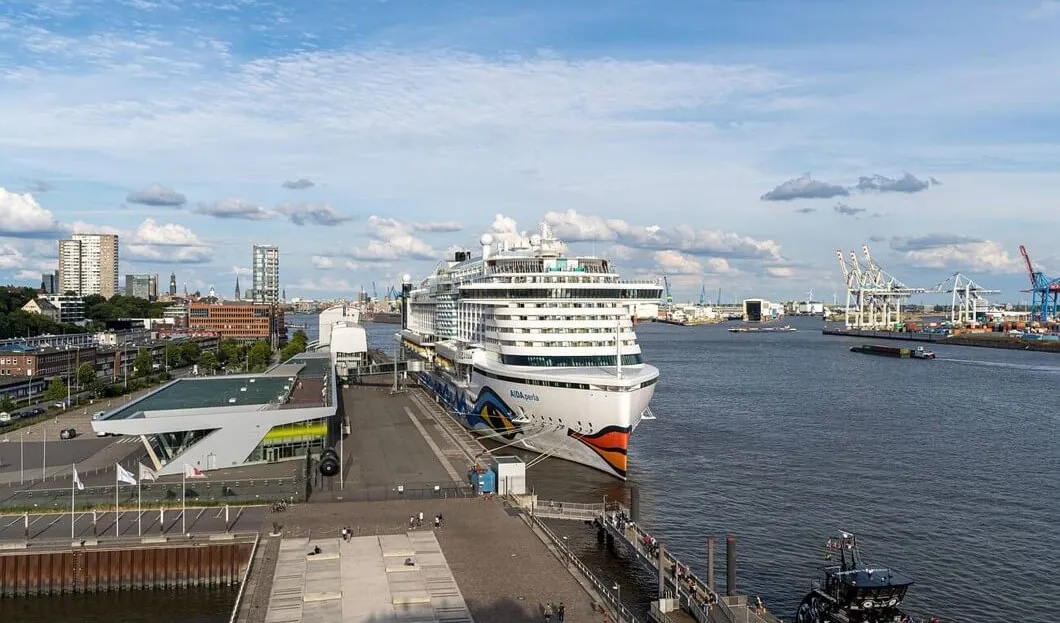
There have never been so many ships! Hamburg has experienced a new cruise record this year. Cruise Gate Hamburg GmbH (CGH) expects a total of 280 calls by 49 ships by the end of the year. And next year there could be even more ships!
The Corona crisis seems to have been finally overcome. According to Cruise Gate Hamburg GmbH (CGH), more cruise ships have come to the Hanseatic city this year than ever before. So far there have already been 257 calls, said CGH managing director Simone Maraschi. By the end of the year, that could turn into 280 calls! A total of 49 offshore ships came, some of them several times. In addition, there were 41 calls by river cruise ships completing Hamburg’s cruise record.
More Cruise Ships but Fewer Passengers
This is the busiest season ever for calls, surpassing the last pre-Corona season in 2019 by 70 calls, Maraschi said. CGH is responsible for operating the cruise terminals and allocating berths.
What sounds like a success story for the tourist city of Hamburg, however, has a catch: many ships do not mean many visitors! As Maraschi explained, the number of passengers does not yet reach the pre-crisis levels. In total, the Hanseatic city expects around 750,000 passengers for the entire season. In 2018, the Port of Hamburg welcomed more than 900,000 passengers on 220 calls.
Next Year New Cruise Record Expected
Nevertheless, Maraschi remains optimistic. Next year, he expects 780,000 to one million passengers.
He put the number of calls in the coming year at 284 for offshore ships, including 8 first calls, and 37 for river cruise ships. Eight offshore ships and two river cruise ships are registered for the Cruise Days from September 8 to 10 alone. For the 834th Port Birthday from 5 to 7 May, seven cruise ships are expected in the Port of Hamburg.

New Trend: Winter and Off-season Cruises
According to Maraschi, the trend towards winter and low-season cruises that began in 2021 will continue this year and in the years to come. They are now an important part of the shipping companies' planning. Last year alone, there were 108 calls with 112,000 passengers.
CGH manages and allocates berths for cruise ships at Steinwerder, Altona, Baakenhöft and, from the end of 2023, HafenCity. It relies on shore-side power supply for cruise ships at all berths. This has already been in place in Altona since 2016, and is to follow in Steinwerder next year. "By 2025, Hamburg will have equipped all its cruise terminals with shore power," Maraschi announced.
Shore-side Power Plants Hardly Used
Shore-side electricity is seen as a building block on the road to climate neutrality in shipping. Until now, many offshore ships have left their engines running in port to supply themselves with electricity - with corresponding exhaust gases and CO2 emissions. According to the international industry association Clia, 35% of global cruise ship capacity is now equipped with shore power connections. More than 80% of all new buildings already have shore power connections from the shipyard. At the same time, however, there are not even 20 ports worldwide that offer shore power for large cruise ships.
The use of existing shore-side electricity capacities in Hamburg has so far been manageable, especially as shipowners have repeatedly pointed out in the past that the electricity produced on the ships is cheaper than green shore-side electricity. According to CGH, the plant in Altona has been used for 30 calls this season. In 2023, shore power is to be used for 50 calls, provided that the system at the Steinwerder terminal is also in operation by then.
"We all have an interest in ensuring that shore power facilities that are ready are also operated," said the head of the port authority HPA, Jens Meier. He also recalled that the cruise ship owners had committed themselves in the Clia to using shore-side electricity if it was offered. With regard to the EU's Fit for 55 program, according to which all major ports in the European Union must have a shore-side electricity supply by 2030, Meier said that the port authority was in close contact with Le Havre, Rotterdam, Antwerp and Bremerhaven in particular.









